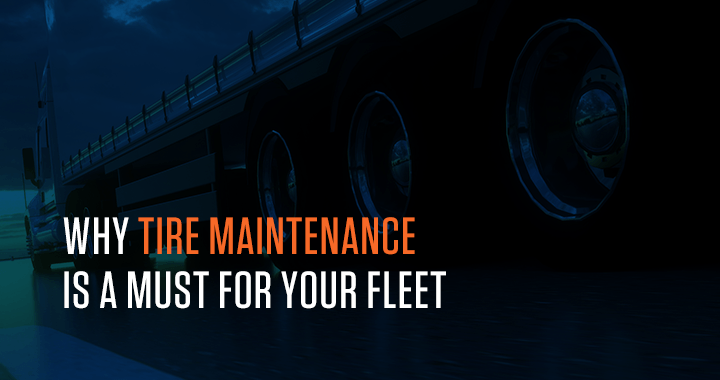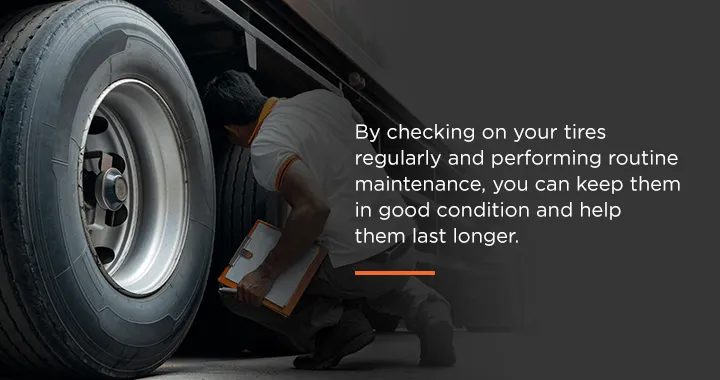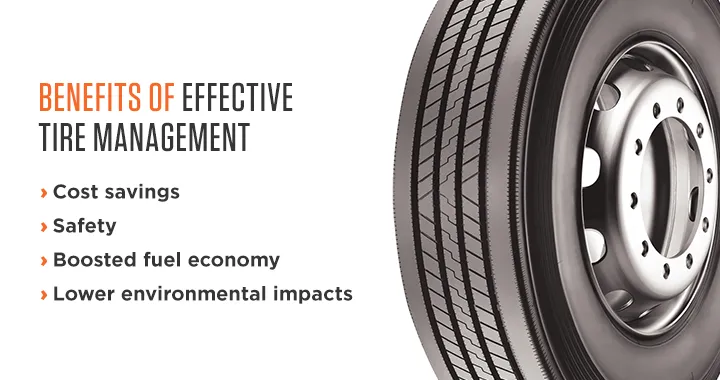

When your fleet of trucks is on the road, you need to know your vehicles are safe and reliable. You want to be sure they’ll get to their destinations safely without causing accidents or becoming delayed.
You also need your trucks to be a smart investment for your business. Knowing that the parts and accessories you choose for your fleet are durable and fuel-efficient gives you peace of mind. It ensures your financial success and lets you pursue new growth opportunities with confidence.
Regular tire maintenance is an excellent solution for both of these concerns. Comprehensive fleet management for tires saves you money, increases your fleet safety, and makes your operations more efficient overall.

Fleet tire management involves developing a strategy to monitor and maintain your fleet’s tires. By checking on your tires regularly and performing routine maintenance, you can keep them in good condition and help them last longer. You’ll also boost safety for your drivers and other people on the road.
When creating a tire maintenance strategy, you need a clear plan to see the best results. Here are a few key elements to include in your plan:
Underinflated tires are bad news. Tire underinflation causes more of the tire to come into contact with the road. That extra contact increases friction, which can lead to premature wear, low fuel economy and tire blowouts. Overinflated tires are equally problematic because they cause uneven wear, which can also facilitate dangerous blowouts. Companies should maintain targeted pressures for their tires, perform periodic air pressure checks, use calibrated air pressure gauges and train drivers to check their tire pressure frequently.
Bald tires are also dangerous. If your fleet’s tire treads become too worn, the tires won’t have enough traction to grip the road. They’ll become slippery and dangerous, especially in bad weather. Your trucks may hydroplane in the rain or slide and jackknife on snow and ice.
The wear and tear on vehicle tires don’t generally distribute itself evenly. Tires tend to wear differently at different positions because no vehicle can ever be perfectly balanced in all directions. Therefore, it’s important to rotate your fleet’s tires to avoid creating uneven wear patterns. Decreasing wear patterns by rotating tires also helps them last longer and saves you money.
Improper wheel alignment causes various truck performance and safety issues, from uneven wear to stress in the suspension to trouble with the steering and braking. Regularly checking and adjusting the wheel alignment helps your fleet perform better and avoid accidents.
Ideally, your fleet drivers should check their tire pressure and treads every day before heading out on the road. They should also perform similar inspections at the end of each day. Truck tires encounter hundreds of obstacles every day, from potholes to nails to tiny pieces of grit. This means the condition of a vehicle’s tires can change without warning. If drivers monitor their tire conditions, they can avoid situations where a blowout or accident could occur.
With so many tire types and brands on the market, it’s worth making sure you get the tires that are right for your trucks, their duty applications and the conditions they drive in. Consider the load types, mileage, weather and climate your fleet will likely encounter on each trip. Then you can choose the tires that will perform best under your specific route conditions.

Proper tire management requires a little extra time and planning. It’s worth every minute, though, because of the benefits you gain from a good maintenance program:
Providing the right fleet management and tire maintenance allows you to streamline your operations and make them safer and more efficient. To take that safety and efficiency to the next level, consider investing in a GPS fleet tracking system as well.
Fleet tracking devices and software offer several advantages for your business. They enable you to control fuel waste, reduce speeding, gauge driving behaviors and efficiency, enhance safety and ensure your loads get where they need to go. You can also configure the software to tell you when you need to perform tasks like rotating and inflating tires, so your tire maintenance program becomes simpler and more reliable.
Request a quote today to see what Track Your Truck’s fleet tracking services can do for you.